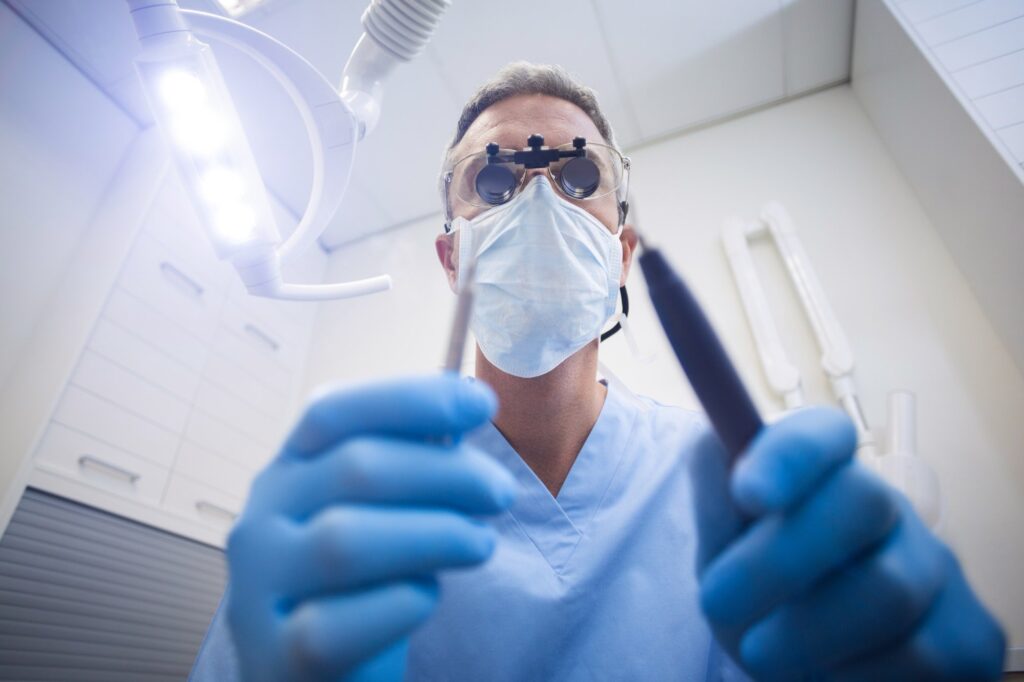For many people, dental anxiety is a significant barrier to receiving proper dental care. Have you ever wondered if there’s an option to ease the stress of dental treatments? Nitrous Oxide Sedation, commonly known as “laughing gas,” is a mild sedative that can help alleviate this anxiety. This method allows patients to remain conscious and cooperative while feeling relaxed.
But what exactly is nitrous oxide sedation, and how does it work?
How Does Nitrous Oxide Sedation Work?
Nitrous oxide sedation involves inhaling a blend of nitrous oxide and oxygen through a nasal mask. Dental professionals carefully adjust the nitrous oxide concentration using flow meters. Within a matter of minutes, the gas induces a state of calm without putting the patient to sleep. This conscious sedation technique allows patients to respond to verbal commands while reducing discomfort during procedures.
What Level of Sedation Is Nitrous Oxide?
Nitrous oxide is considered a form of minimal to moderate sedation in dentistry. It enables patients to maintain their protective reflexes and communicate effortlessly. As a mild sedative, it doesn’t induce unconsciousness, making it one of the safest sedation options for dental practices. The level of sedation can be easily modified to meet the patient’s comfort level. Utilizing adjustable sedation levels ensures adequate sedation tailored to individual needs.
What Type of Sedation Is Nitrous Oxide?
Nitrous oxide is categorized as an inhalation anesthetic and conscious sedation method. This type of sedation is distinguished by its rapid onset and quick recovery time. It acts as an anxiolytic agent that significantly reduces anxiety during procedures. It’s often combined with other anesthetic agents to enhance its analgesic properties. This type of sedation is commonly used in both pediatric and adult patients to facilitate a more comfortable dental experience.
What Are the Benefits of Nitrous Oxide Sedation?
Alleviates Dental Anxiety
Nitrous oxide is highly effective for patients with dental anxiety or fear of dental procedures. Its anxiolytic properties help in calming the patient, making dental visits less stressful. This sedative agent can ease patient anxiety quickly, enabling smoother dental treatments. It is especially useful for anxious patients, allowing them to undergo necessary dental care without undue stress. This method can make dental care more accessible for patients with severe anxiety.
Rapid Onset and Easy Adjustment
Another advantage of nitrous oxide sedation is its fast-acting nature. Patients typically begin to feel the sedative effects within minutes. Dental professionals can easily control the flow of gas, ensuring an appropriate level of sedation. The rapid onset allows for minimal downtime before and after the procedure. This convenience makes it a popular choice in many dental practices.
Minimal Side Effects
Nitrous oxide is among the mildest forms of sedation with limited potential side effects. Most patients experience minimal discomfort and recover quickly. Common side effects include slight dizziness or nausea, which tend to dissipate rapidly. Compared to other sedatives, there is less concern regarding long-term adverse health effects. This makes it a reliable and safer choice for many dental procedures.
Safe for Various Age Groups
Nitrous oxide sedation is safe and effective for both pediatric and adult patients. It helps make younger, fearful patients more cooperative during dental treatments. Additionally, adults, especially those with sensitive teeth or low pain thresholds, benefit greatly from this sedation option. With proper guidance and monitoring, Nitrous oxide offers a safe experience across age groups. It ensures that dental care is accessible for all patients, regardless of age.
Aids in Complex Procedures
Dentists often use nitrous oxide sedation to facilitate more complex and extensive dental procedures. This technique is beneficial for procedures such as oral surgery, tooth extractions, and other minor surgical procedures. By utilizing this sedation technique, dental professionals can perform more invasive treatments with fewer interruptions. It can lower the risk of untoward movement during intricate procedures. Nitrous oxide supports more efficient completion of dental work due to patient cooperation.
Enhances Overall Dental Experience
The mild sedative effect of nitrous oxide enhances the overall dental experience for patients. It promotes a calm and mild sense of euphoria, ensuring the patient remains comfortable throughout the procedure. Nitrous oxide helps decrease excessive sweating and reduces feelings of discomfort, making the entire dental process more pleasant. The patient can communicate any issues or concerns throughout the treatment. This sedation ensures a smoother, more stress-free dental visit.
What Are the Potential Risks of Nitrous Oxide Sedation?
Short-Term Side Effects
While generally safe, nitrous oxide sedation does present some common side effects. Patients may experience dizziness, nausea, or excessive sweating. These symptoms are usually mild and temporary, resolving quickly after the gas is turned off. Most patients return to their normal state shortly after the procedure. Understanding these potential side effects helps in making informed sedation decisions.
Contraindications for Certain Patients
Nitrous oxide sedation may not be suitable for patients with specific medical conditions. Those with respiratory conditions or severe respiratory issues may experience adverse effects. Cardiovascular risks, such as congestive heart failure, can also limit its use. Pregnant women must exercise caution due to the risk of spontaneous abortion. A thorough medical history review is essential for identifying contraindications.
Possibility of Allergic Reactions
Although rare, some patients might experience allergic reactions to nitrous oxide. Symptoms could include hives, coughing, or nasal congestion during or after sedation. It’s crucial to inform dental professionals of any known allergies prior to using nitrous oxide. If an allergic reaction occurs, immediate action will be taken. Understanding patient allergies ahead of time ensures optimal care and minimizes risks.
Potential Long-Term Effects
Prolonged or frequent exposure to nitrous oxide may lead to some long-term health effects. For example, chronic exposure is associated with conditions such as blood dyscrasias. Occupational Safety and Health Administration (OSHA) has set exposure limits to mitigate these risks. Dental practices must maintain proper ventilation and adhere to guidelines to protect patients and staff. Being aware of these potential risks helps ensure a safer sedation environment.
Impacts on Mental Health
Patients with underlying mental health conditions should be cautious with nitrous oxide use. The sedative can interact with anti-anxiety medications or antidepressants, altering their effects. Symptoms such as increased anxiety or altered heart rhythm can occur. A detailed evaluation by medical professionals is advisable before opting for this sedation. Screening patients thoroughly helps avoid negative experiences related to nitrous oxide sedation.
Experience Comfortable Dental Care With Nitrous Oxide Sedation at Casey Dental Today
Nitrous oxide sedation is a valuable option for those who experience dental anxiety or require stress-free dental treatments. At Casey Dental, our highly qualified dental professionals prioritize patient comfort and care. By offering nitrous oxide sedation, we aim to make dental visits more pleasant and less stressful for everyone. Our patient’s well-being remains our top priority. Don’t let dental anxiety keep you from receiving the care you need.
At Casey Dental, we provide comprehensive dental services, including nitrous oxide sedation, to ensure your visits are as comfortable as possible. Call us today to schedule an appointment and see why Casey Dental is an award-winning practice in Luzerne County. Your oral health and comfort are our commitments.
Frequently Asked Question
What are the benefits of using nitrous oxide sedation during dental procedures?
Nitrous oxide sedation offers several benefits for dental patients. It helps alleviate dental anxiety, allowing individuals to feel more comfortable during procedures. The sedation has a rapid onset and can be easily adjusted by dental professionals to meet the patient’s needs. It is known for having minimal side effects and is considered safe for various age groups. Additionally, it aids in complex procedures by keeping patients calm and cooperative.
How does nitrous oxide sedation help alleviate dental anxiety?
Nitrous oxide sedation, commonly referred to as ‘laughing gas,’ helps alleviate dental anxiety by inducing a state of relaxation while keeping the patient conscious. Patients inhale a blend of nitrous oxide and oxygen, which quickly calms them without causing sleepiness. This allows them to respond to verbal commands and reduces discomfort during dental treatments, making the experience less stressful.
Is nitrous oxide sedation safe for children?
Yes, nitrous oxide sedation is considered safe for children. It is a mild sedative that is carefully administered by dental professionals, who adjust the concentration to ensure safety and efficacy. The sedation helps manage anxiety and discomfort, making dental visits more pleasant for young patients.


